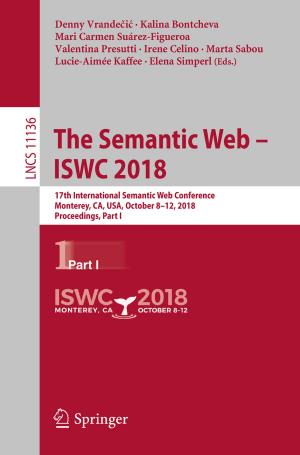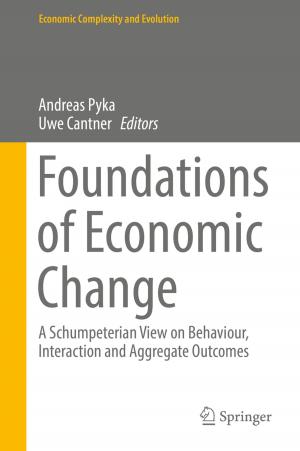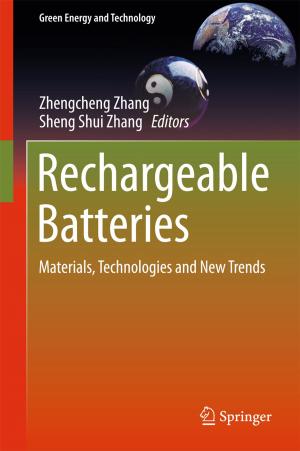Energy Resources in Africa
Distribution, Opportunities and Challenges
Nonfiction, Science & Nature, Science, Earth Sciences, Mineralogy, Business & Finance, Industries & Professions, Industries, Technology| Author: | Herick Othieno, Joseph Awange | ISBN: | 9783319251875 |
| Publisher: | Springer International Publishing | Publication: | October 16, 2015 |
| Imprint: | Springer | Language: | English |
| Author: | Herick Othieno, Joseph Awange |
| ISBN: | 9783319251875 |
| Publisher: | Springer International Publishing |
| Publication: | October 16, 2015 |
| Imprint: | Springer |
| Language: | English |
This book provides information on the distribution of the available energy resources throughout the continent and how it is linked to the development of individual states. Africa is considered one of the poorest continents in the world, mainly because its development has historically depended on imported resources including technical expertise. This view and its associated resource management strategy are based on the perception that Africa lacks sufficient energy resources to drive its development agenda. Analyses of individual countries’ energy potentials, exploitation levels and distribution mechanisms are provided with a view to identifying additional factors that are stifling Africa’s economic development. One critical factor is the relationship between available energy resources and the energy mixes chosen by different states, and how these can be exploited to produce the right blend of energy for various applications such as industrial, transport, domestic, and recreational uses. The authors provide an in-depth analysis of the advantages and disadvantages of different energy sources in terms of their environmental, industrialization and distribution costs, impacts, and the development options best suited for improving Africa’s economic situation. This analysis is based on the assertion that Africa is indeed blessed with abundant energy resources, which have not been effectively exploited. The book not only reviews Africa’s energy situation in general, but also reveals that, while there are certainly circumstances peculiar to individual countries, the similarities, especially within Sub-Saharan African countries, outweigh the differences. That being said, the challenges and available opportunities in each country should be viewed with due consideration given to the prevailing national resource management environment. Many initiatives in Africa fail because of the many loopholes in the management structures, which allow corruption, theft, and mere selfishness to thrive. In addition to the negative impacts of these factors on implementation activities, there is also a general lack of institutional support for initiatives that could otherwise be very progressive. Thus, taken together, these retrogressive practices stifle African energy development plans. The book offers a valuable guide for developers, investors, researchers and environmentalist, providing in-depth insights on the relationship between available energy resources and development trends in Africa.
"By harnessing the wind and sun, your vast geothermal energy and rivers for hydropower, you can turn this climate threat into an economic opportunity." US President Obama's address to the African Union (2015)
This book provides information on the distribution of the available energy resources throughout the continent and how it is linked to the development of individual states. Africa is considered one of the poorest continents in the world, mainly because its development has historically depended on imported resources including technical expertise. This view and its associated resource management strategy are based on the perception that Africa lacks sufficient energy resources to drive its development agenda. Analyses of individual countries’ energy potentials, exploitation levels and distribution mechanisms are provided with a view to identifying additional factors that are stifling Africa’s economic development. One critical factor is the relationship between available energy resources and the energy mixes chosen by different states, and how these can be exploited to produce the right blend of energy for various applications such as industrial, transport, domestic, and recreational uses. The authors provide an in-depth analysis of the advantages and disadvantages of different energy sources in terms of their environmental, industrialization and distribution costs, impacts, and the development options best suited for improving Africa’s economic situation. This analysis is based on the assertion that Africa is indeed blessed with abundant energy resources, which have not been effectively exploited. The book not only reviews Africa’s energy situation in general, but also reveals that, while there are certainly circumstances peculiar to individual countries, the similarities, especially within Sub-Saharan African countries, outweigh the differences. That being said, the challenges and available opportunities in each country should be viewed with due consideration given to the prevailing national resource management environment. Many initiatives in Africa fail because of the many loopholes in the management structures, which allow corruption, theft, and mere selfishness to thrive. In addition to the negative impacts of these factors on implementation activities, there is also a general lack of institutional support for initiatives that could otherwise be very progressive. Thus, taken together, these retrogressive practices stifle African energy development plans. The book offers a valuable guide for developers, investors, researchers and environmentalist, providing in-depth insights on the relationship between available energy resources and development trends in Africa.
"By harnessing the wind and sun, your vast geothermal energy and rivers for hydropower, you can turn this climate threat into an economic opportunity." US President Obama's address to the African Union (2015)















